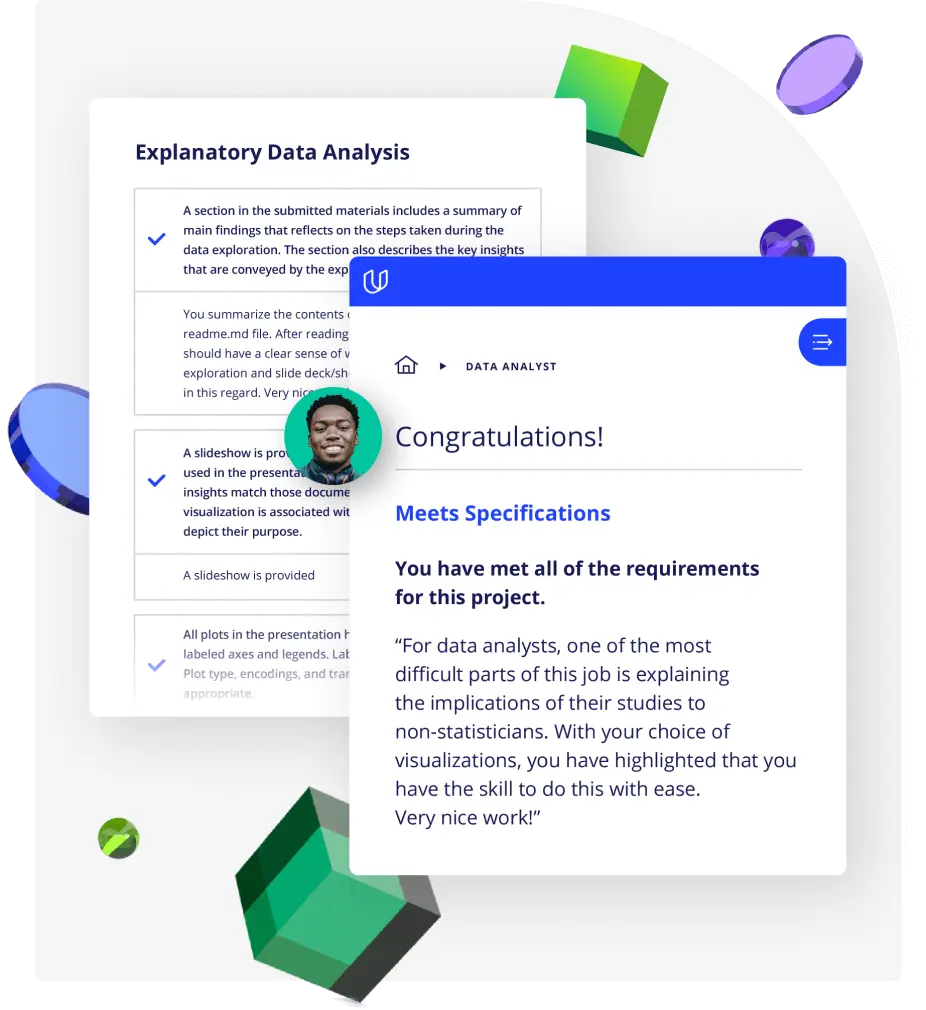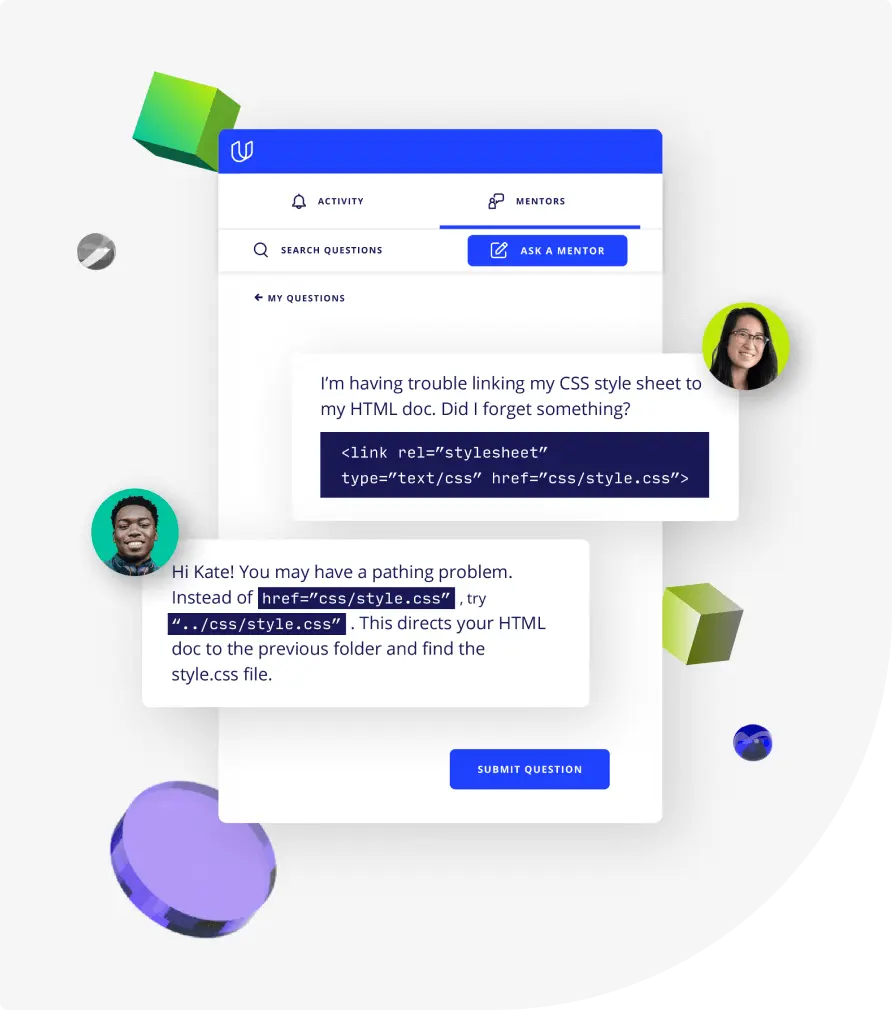Lesson 1
Welcome to Machine Learning
Welcome to the Machine Learning Engineer Nanodegree program! Learn about the program structure and the projects you'll work on in this program.

Nanodegree Program
The Intro to Machine Learning with Pytorch program covers machine learning concepts and techniques, with a focus on supervised and unsupervised learning. The program includes three courses and covers topics such as linear regression, logistic regression, decision trees, Naive Bayes, support vector machines, neural networks, and clustering. The courses include projects that allow learners to apply these techniques to real-world problems, such as identifying potential donors for a charity and clustering customers based on their spending habits. The program uses Python and PyTorch for implementation and includes lessons on model evaluation and tuning.
The Intro to Machine Learning with Pytorch program covers machine learning concepts and techniques, with a focus on supervised and unsupervised learning. The program includes three courses and covers topics such as linear regression, logistic regression, decision trees, Naive Bayes, support vector machines, neural networks, and clustering. The courses include projects that allow learners to apply these techniques to real-world problems, such as identifying potential donors for a charity and clustering customers based on their spending habits. The program uses Python and PyTorch for implementation and includes lessons on model evaluation and tuning.
Intermediate
3 months
Real-world Projects
Completion Certificate
Last Updated June 16, 2024
Skills you'll learn:
Prerequisites:
Course 1 • 1 hour
Welcome to Machine learning with Pytorch
Lesson 1
Welcome to the Machine Learning Engineer Nanodegree program! Learn about the program structure and the projects you'll work on in this program.
Lesson 2
What to do if you have questions about your account or general questions about the program.
Lesson 3
In this lesson, get your computer set up with Python 3 using Anaconda, as well as setting up a text editor.
Course 2 • 3 weeks
In this course, you'll learn about different types of supervised learning and how to use them to solve real-world problems.
Lesson 1
Before diving into the many algorithms of machine learning, it is important to take a step back and understand the big picture associated with the entire field.
Lesson 2
Linear regression is one of the most fundamental algorithms in machine learning. In this lesson, learn how linear regression works!
Lesson 3
The perceptron algorithm is an algorithm for classifying data. It is the building block of neural networks.
Lesson 4
Decision trees are a structure for decision-making where each decision leads to a set of consequences or additional decisions.
Lesson 5
Naive Bayesian Algorithms are powerful tools for creating classifiers for incoming labeled data. Specifically Naive Bayes is frequently used with text data and classification problems.
Lesson 6
Support vector machines are a common method used for classification problems. They have been proven effective using what is known as the 'kernel' trick!
Lesson 7
Bagging and boosting are two common ensemble methods for combining simple algorithms to make more advanced models that work better than the simple algorithms would on their own.
Lesson 8
Learn the main metrics to evaluate models, such as accuracy, precision, recall, and more!
Lesson 9
Learn the main types of errors that can occur during training, and several methods to deal with them and optimize your machine learning models.
Lesson 10 • Project
You've covered a wide variety of methods for performing supervised learning -- now it's time to put those into action!
Course 3 • 4 weeks
Learn the fundamentals of neural networks with Python and PyTorch, and then use your new skills to create your own image classifier—an application that will first train a deep learning model on a dataset of images and then use the trained model to classify new images.
Lesson 1
Meet your instructors, get a short overview of what you'll be learning, check your prerequisites, and learn how to use the workspaces and notebooks found throughout the lessons.
Lesson 2
In this lesson, Luis will give you solid foundations on deep learning and neural networks. You'll also implement gradient descent and backpropagation in Python right here in the classroom.
Lesson 3
Mat will introduce you to a different error function and guide you through implementing gradient descent using numpy matrix multiplication.
Lesson 4
Now that you know what neural networks are, in this lesson you will learn several techniques to improve their training.
Lesson 5
Learn how to use PyTorch for building deep learning models.
Lesson 6 • Project
In this project, you'll create your own image classifier and then train—and evaluate its performance—using one of the most classic and well-studied computer vision data sets, CIFAR-10.
Course 4 • 4 weeks
In this course, you'll learn how to apply unsupervised learning to solve real-world problems.
Lesson 1
Clustering is one of the most common methods of unsupervised learning. Here, we'll discuss the K-means clustering algorithm.
Lesson 2
We continue to look at clustering methods. Here, we'll discuss hierarchical clustering and density-based clustering (DBSCAN).
Lesson 3
In this lesson, we discuss Gaussian mixture model clustering. We then talk about the cluster analysis process and how to validate clustering results.
Lesson 4
Often we need to reduce a large number of features in our data to a smaller, more relevant set. Principal Component Analysis, or PCA, is a method of feature extraction and dimensionality reduction.
Lesson 5
In this lesson, we will look at two other methods for feature extraction and dimensionality reduction: Random Projection and Independent Component Analysis (ICA).
Lesson 6 • Project
In this project, you'll apply your unsupervised learning skills to two demographics datasets, to identify segments and clusters in the population, and see how customers of a company map to them.

Staff Data Scientist
Josh has been sharing his passion for data for over a decade. He's used data science for work ranging from cancer research to process automation. He recently has found a passion for solving data science problems within marketplace companies.

Content Developer
Mat is a former physicist, research neuroscientist, and data scientist. He did his PhD and Postdoctoral Fellowship at the University of California, Berkeley.

Instructor
Andrew has an engineering degree from Yale, and has used his data science skills to build a jewelry business from the ground up. He has additionally created courses for Udacity's Self-Driving Car Engineer Nanodegree program.

Instructor
Jennifer has a PhD in Computer Science and a Masters in Biostatistics; she was a professor at Florida Polytechnic University. She previously worked at RTI International and United Therapeutics as a statistician and computer scientist.

Instructor
Dan leads Amazon AI's Business Development efforts for Machine Learning Services. Day to day, he works with customers—from startups to enterprises—to ensure they are successful at building and deploying models on Amazon SageMaker.

Curriculum Lead
Cezanne is an expert in computer vision with a Masters in Electrical Engineering from Stanford University. As a former researcher in genomics and biomedical imaging, she's applied computer vision and deep learning to medical diagnostic applications.

Instructor
Sean Carrell is a former research mathematician specializing in Algebraic Combinatorics. He completed his PhD and Postdoctoral Fellowship at the University of Waterloo, Canada.

Instructor
Jay is a software engineer, the founder of Qaym (an Arabic-language review site), and the Investment Principal at STV, a $500 million venture capital fund focused on high-technology startups.

Instructor
Luis was formerly a Machine Learning Engineer at Google. He holds a PhD in mathematics from the University of Michigan, and a Postdoctoral Fellowship at the University of Quebec at Montreal.
Average Rating: 4.7 Stars
235 Reviews
abdulrahman a.
July 19, 2022
everything were explained very well
Omer A.
April 27, 2022
Decent.
Narendhra Kumar M.
March 11, 2022
Good , yes Definitely but would need more time to understand the concepts in details. Because we are learning a lot of concepts
Abdullah A.
March 9, 2022
everything is great and makes me want to learn more ! but at the first 3 weeks i had faced some issues in my class room that stopped my learning. i tried to solve this problem by myself but i couldn't find any solution. i tried to send a ticket but web q/a provided me invalid solution, at the end i found out about udacity support account on twitter, i contacted them and by the way Brittany was a nice person. she sent a ticket to support on 27/1/2022. In 9/2/2022, Brittany contacted me and said problem was solved and everything should be ok. This problem/issue took from me many days of learning and i am afraid of the remaining time limit.
Rohit A.
March 7, 2022
yup pretty good, the projects also well designed. Although the instructor notes are missing from some of the deep learning lectures
Combine technology training for employees with industry experts, mentors, and projects, for critical thinking that pushes innovation. Our proven upskilling system goes after success—relentlessly.

Demonstrate proficiency with practical projects
Projects are based on real-world scenarios and challenges, allowing you to apply the skills you learn to practical situations, while giving you real hands-on experience.
Gain proven experience
Retain knowledge longer
Apply new skills immediately

Top-tier services to ensure learner success
Reviewers provide timely and constructive feedback on your project submissions, highlighting areas of improvement and offering practical tips to enhance your work.
Get help from subject matter experts
Learn industry best practices
Gain valuable insights and improve your skills

Unlimited access to our top-rated courses
Real-world projects
Personalized project reviews
Program certificates
Proven career outcomes
Full Catalog Access
One subscription opens up this course and our entire catalog of projects and skills.
Average time to complete a Nanodegree program
(256)
2 months
, Intermediate
(909)
4 months
, Intermediate
4 weeks
, Intermediate
4 weeks
, Beginner
(87)
4 months
, Advanced
3 weeks
, Intermediate
(450)
3 months
, Advanced
(275)
2 months
, Advanced
3 days
, Intermediate
(328)
2 months
, Advanced
(496)
5 months
, Advanced
4 weeks
, Intermediate
(67)
3 months
, Intermediate
(81)
2 months
, Intermediate
1 month
, Intermediate
4 months
, Intermediate

Introduction to Machine Learning with Pytorch
(256)
2 months
, Intermediate
(909)
4 months
, Intermediate
4 weeks
, Intermediate
4 weeks
, Beginner
(87)
4 months
, Advanced
3 weeks
, Intermediate
(450)
3 months
, Advanced
(275)
2 months
, Advanced
3 days
, Intermediate
(328)
2 months
, Advanced
(496)
5 months
, Advanced
4 weeks
, Intermediate
(67)
3 months
, Intermediate
(81)
2 months
, Intermediate
1 month
, Intermediate
4 months
, Intermediate